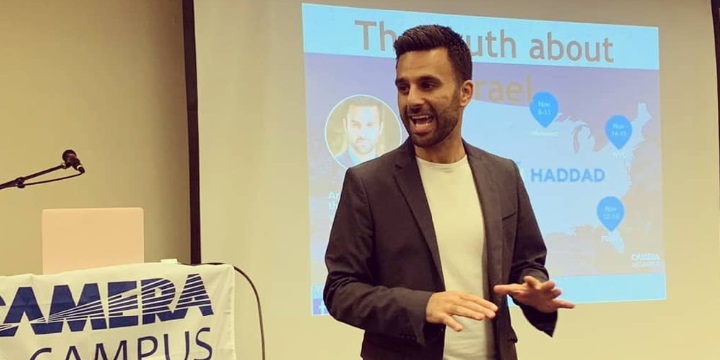
Yoseph Haddad speaks at San Francisco State University on Nov. 5, 2019. Photo: Yoseph Haddad / Instagram
Israeli Arab Christian Traces Journey From IDF to Interfaith Activism
by Daniel Yeluashvili Algemeiner
On November 5th, San Francisco State University was visited by a guest the likes of whom is seldom expected. His name is Yoseph Haddad and he is a social activist, a former soldier in the Israel Defense Forces, and a survivor of a missile attack by the Lebanese terrorist group Hezbollah. He is also a proud Israeli Arab, one of the country’s approximately 1.8 million, and loves his home country. Haddad’s intersectional identity as an Israeli, Arab, Christian and trauma survivor is a testament to the value of untold stories like his.
Yoseph Haddad was born in the Israeli city of Nazareth — yes, that Nazareth — which has a predominantly Arab population. He grew up wanting to serve in the IDF, which Israeli Jews are obligated to do by law (with few exceptions) and Arabs are allowed to but, for various reasons, often don’t. Primarily, there is a cultural stigma among Israeli Arabs towards serving in the IDF; some identify more with Palestinian national identity than Israel’s, despite the fact that the majority of the Israeli Arab population is proud of their nationality.
Yet Haddad not only felt pride in his nationality, he acted on it. At the age of 18, he enlisted to serve in the IDF and was accepted to the Golani Brigade, an infantry unit that traditionally operates in the formerly Syrian Golan Heights. In 2006, towards the end of his service and amid the Second Lebanon War, Haddad suffered one of the most traumatic experiences of his life: a Hezbollah missile killed his squadmates and severely injured him during a battle in Bint J’bil, Lebanon.
“All I could think,” Haddad recalls, “is ‘what am I going to say to my mother?’”
Having since recovered from his injury, Haddad is now the founder and CEO of an interfaith nonprofit called Together — Vouch for Each Other, which facilitates dialogue between Israelis and Palestinians. He has personally experienced hateful attacks and harassment from Jews and Arabs alike, motivated by bigotry, but responds to them with discussion and an open mind.
One such example came from an Israeli Jew who said he’d never met a friendly Arab and that there was no such thing. One long discussion later, he agreed to join Haddad and Together — Vouch for Each Other and to attend future events.
Yoseph Haddad is a unique individual: an Israeli Arab Christian who has experienced life with a disability. At the same time, he’s no different from anybody else, as we are all capable of making a difference in society through open-minded dialogue.








